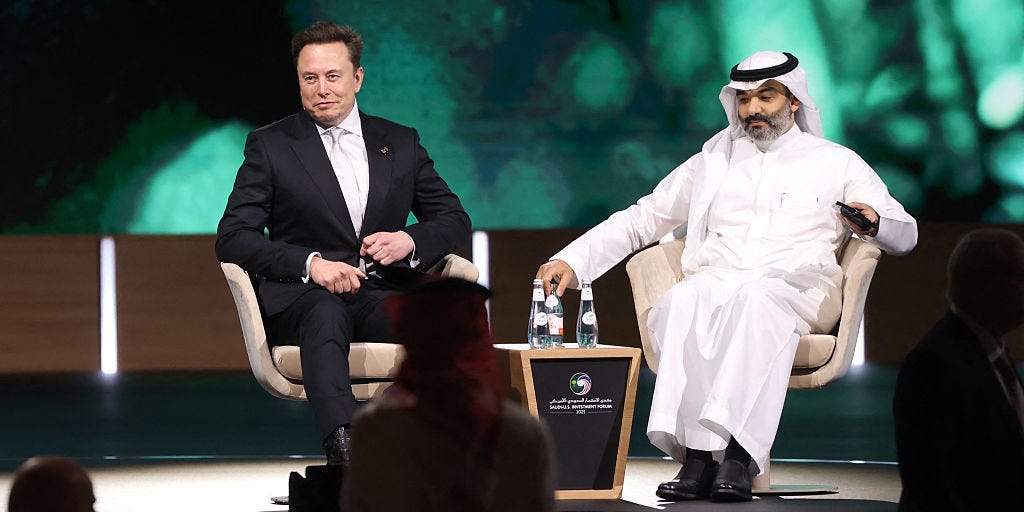Tesla CEO Elon Musk said he wants to bring robotaxis to Saudi Arabia, where Uber is already laying the groundwork to launch autonomous vehicles later this year.
At the US-Saudi Investment Forum on Tuesday, Musk made a big push for robotics in Saudi Arabia, including self-driving cars.
“Really you can think of future cars as being robots on four wheels, and I think it would be very exciting to have autonomous vehicles here in the Kingdom if you’re amenable,” Musk said to Abdullah Alswaha, Saudi’s Minister of Communications and Information Technology.
Musk didn’t provide any details or timeline for when that could happen.
Tesla has yet to launch its robotaxi service to the public anywhere in the world. The company has said it plans to launch a pilot of the service in Austin in June. Musk said the ramp-up for expansion afterward should be quick.
A Tesla spokesperson did not respond to a request for comment.
Saudi Arabian leaders have said they want autonomous vehicles to play a role in the country’s broader Vision 2030 modernization plans, which aim to reduce the region’s economic dependence on oil by making heavy investments in technology. The country last year released a regulatory framework around the adoption of self-driving cars.
Uber announced on May 6 that it plans to deploy robotaxis in the Kingdom sometime this year through its partnership with China’s Pony.AI. The company hasn’t specified a date.
Pony.AI’s robotaxi ambitions in the US came to a screeching halt in 2022 after the Department of Motor Vehicles revoked its California permit, citing multiple driving violations. The startup continues to offer autonomous rides to the public in China.
A spokesperson for Pony.AI did not respond to a request for comment.
Saudi Arabia’s Transport General Authority said Tuesday in a post on X that the agency had signed a memorandum of understanding with Uber to launch autonomous vehicles in the Kingdom. An MOU is not binding and simply signals an intent to collaborate.
“First autonomous vehicles expected to launch on the Uber platform with onboard safety operators in 2025,” the Transport General Authority wrote.
Uber is already a sizable player in the Kingdom’s rideshare market.
The company owns Careem, which is the go-to ride-hailing app in the Middle East, operating in 26 cities throughout the Kingdom. Uber also separately operates its ridesharing service in the region.
A spokesperson for Uber declined to comment. A spokesperson for Careem did not respond to a request for comment.
Have a tip? Contact this reporter via email at lloydlee@businessinsider.com or Signal at lloydlee.07. Use a personal email address and a nonwork device; here’s our guide to sharing information securely.
Read the full article here


